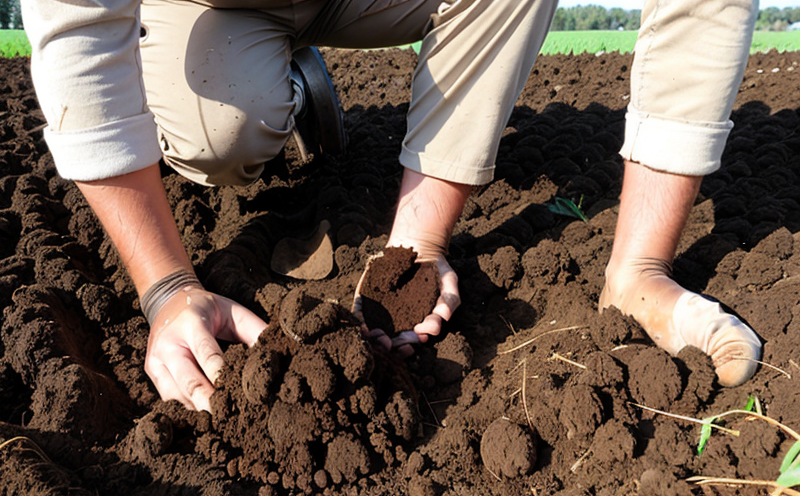Soil Nematode Population Testing
Soil nematodes are microscopic organisms that play a crucial role in soil health and plant growth. Understanding their population dynamics is vital for sustainable agricultural practices, particularly in precision agriculture where every gram of soil can provide key insights into the overall health of crops and ecosystems.
Our Soil Nematode Population Testing service provides comprehensive analysis to help you understand the diverse community structure within your soil samples. By identifying which nematodes are present and quantifying their numbers, we offer critical information that informs decisions on crop nutrition, pest management strategies, and overall soil health maintenance.
The testing process involves collecting representative soil samples from various fields or regions of interest. These samples undergo rigorous preparation methods to ensure they reflect the true diversity of nematode populations present. Once prepared, advanced microscopy techniques are used to visualize and count individual nematodes under high magnification. This allows for accurate enumeration and species identification.
For a more in-depth understanding, we can also employ molecular biology tools such as DNA sequencing to further classify the nematode community based on genetic markers. This approach is especially useful when dealing with closely related species that might be difficult to distinguish visually. Additionally, bioinformatics tools are employed to analyze sequences and provide detailed reports about the community structure.
The results of our tests include a breakdown of different nematode genera and families present in the sample, along with their relative abundances. This data is then interpreted into actionable insights that can guide farm management practices such as crop rotation, fertilization schedules, and integrated pest management programs.
Our laboratory adheres strictly to international standards like ISO 16642 for nematode identification and quantification, ensuring the highest level of accuracy and reliability in our findings. This commitment to precision science ensures that you receive reliable data which can be confidently used to make informed decisions about your agricultural practices.
Understanding soil nematode populations is not only beneficial for traditional agriculture but also increasingly relevant in forestry settings where similar principles apply. In both sectors, maintaining healthy soils through effective management of these tiny yet influential organisms contributes significantly towards sustainable land use and productivity goals.
Why It Matters
The health of soil nematode populations directly impacts agricultural output and the sustainability of farming practices. Nematodes influence nutrient cycling, decomposition processes, and even contribute to plant growth through symbiotic relationships with roots. An imbalance in their population can lead to reduced crop yields, increased susceptibility to diseases, and overall degradation of soil structure.
For instance, certain nematode species are known vectors for plant pathogens, which can significantly impact crop health if left unchecked. Conversely, others serve as essential decomposers that recycle nutrients back into the soil, supporting future crops' growth cycles. Therefore, monitoring these populations is crucial for maintaining balanced ecosystems and optimizing agricultural practices.
Moreover, understanding nematode dynamics helps tailor fertilization strategies more precisely by avoiding over-fertilization or underutilization of certain elements based on current microbial activity levels within the soil. This targeted approach reduces unnecessary chemical inputs while enhancing natural processes that promote healthier soils and stronger plants.
Industry Applications
- Agriculture: Soil nematode testing aids in optimizing fertilizer use, preventing pest outbreaks, and improving overall crop health.
- Farming: Farmers can better manage their land by understanding how nematodes affect soil composition and plant growth rates.
- R&D Engineers: By analyzing nematode populations, they can develop new technologies aimed at enhancing agricultural productivity sustainably.
- Compliance Officers: Ensuring compliance with environmental regulations related to soil health requires accurate assessments of nematode populations.
Quality and Reliability Assurance
To ensure the accuracy and reliability of our Soil Nematode Population Testing service, we follow stringent protocols based on international standards such as ISO 16642. Our laboratory is equipped with state-of-the-art microscopes and other advanced instruments necessary for precise enumeration and identification.
Our team consists of highly trained professionals who possess extensive experience in nematology and related fields. They are committed to delivering consistent, high-quality results every time. Regular calibration of our equipment ensures that all tests meet the highest standards of precision and accuracy.
We also maintain strict quality control measures throughout the entire testing process from sample collection through final analysis. This includes careful handling of samples to prevent contamination or degradation before processing begins. Additionally, we employ rigorous quality assurance checks at various stages to catch any potential errors early on.





